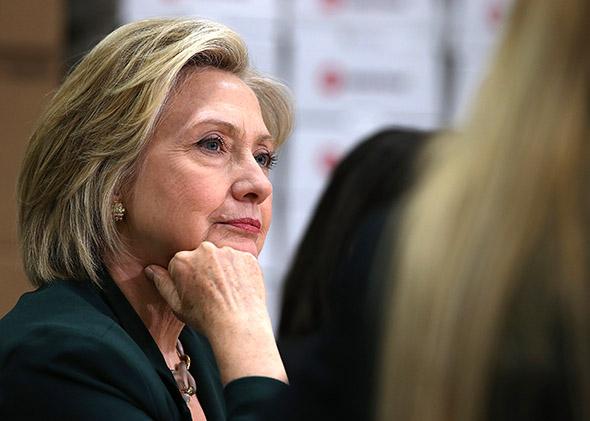People are deservedly angry about the unprecedented flow of money into our elections. On Wednesday a postal worker literally risked his life to land a gyrocopter near the U.S. Capitol to protest the Supreme Court’s decision in Citizens United. The group 99Rise keeps risking jail time by sneaking into the Supreme Court and surreptitiously filming protesters’ outbursts in open court against decisions that have construed the First Amendment to prohibit most limits on money in politics.
So it is understandable that Democratic presidential candidate Hillary Clinton is trying to harness some of that progressive energy by announcing that campaign finance reform is one of the “four big fights” that her campaign will emphasize. But Clinton’s early call for a constitutional amendment to fix campaign finance problems is counterproductive and will only make things worse.
Speaking at a campaign event in Iowa on Tuesday, Clinton declared: “We need to fix our dysfunctional political system and get unaccountable money out of it once and for all, even if it takes a constitutional amendment.”
Clinton is right that we have a big problem with money in politics. From Sheldon Adelson and his wife spending $98 million to $150 million in the 2012 elections to promote Republicans, to environmentalist Tom Steyer spending more than $70 million to promote Democratic Senate candidates in the 2014 elections, to the Koch brothers’ pledge to have their network spend a staggering $889 million in the 2016 elections, we run the risk of our electoral and political system being run by only the wealthiest in society. And thanks to holes in our disclosure system, much of the money contributed to outside groups goes undisclosed, so the public has no idea who is behind the flood of ads aimed at influencing our political choices.
But a constitutional amendment is a terrible way to try to fix the problem. To begin with, to the extent Clinton is concerned simply about undisclosed political money, she should put efforts into fixing the nation’s disclosure laws, something that requires congressional legislation or action from the Internal Revenue Service and the Federal Election Commission. There is no need for a constitutional amendment to fix our disclosure laws. Indeed, say what you want about the Supreme Court’s Citizens United decision, but in its decision the court did offer a ringing endorsement of disclosure laws as constitutionally permissible and even desirable.
Clinton seems to want to do more than deal with undisclosed money; she railed against “unaccountable” money, the money coming from non-party groups such as super PACs, which were unleashed by court rulings and administrative decisions after Citizens United. These groups can take unlimited sums from individuals, corporations, and others to fund election-related activity so long as the activity is independent of candidates.
A constitutional amendment to overturn Citizens United in theory could deal with this problem. But it too is a bad idea. To begin with, it is hard to write an amendment that would be effective in overturning Citizens United without running the risk of squelching too much political speech. Consider what happened when Democrats proposed a constitutional amendment on campaign finance last summer. When Sen. Ted Cruz, now also a presidential candidate, took to the floor of the U.S. Senate to denounce the measure as allowing the government to throw Saturday Night Live producer Lorne Michaels in jail for political satire, Democrats changed the amendment to allow for only “reasonable” limits on reform. By inserting the word reasonable, Democrats would effectively kick the issue back to the courts. Why would anyone think any newly enacted corporate spending limits following a constitutional amendment would be seen as “reasonable” by a conservative majority of the Roberts court?
Aside from the fact that it is hard to write a constitutional amendment neither draconian nor ineffective, the amendment proposal is a political nonstarter. Even if Democrats retake control of the Senate in 2016, there is no supermajority in the Senate (and very unlikely to be even a vote in a Republican House) to overturn Citizens United. An amendment requires not only a vote of two-thirds of each House of Congress, but also approval of three-quarters of the state legislatures. Many Republicans are quite happy with the Citizens United era, and there is no way a campaign finance amendment will pass these days.
Clinton’s call for a constitutional amendment is really just one thing: red meat for Democratic activists. It is a game President Obama has played for years. On the one hand, he has railed against Citizens United and the conservative Supreme Court. On the other hand, he has taken a number of steps to push campaign finance boundaries even further, such as being the first sitting president to set up a 501(c)(4) organization to support his agenda. The president has offered lip service and little else in his time in office. And those same Senate Democrats who favored a constitutional amendment recently pushed a bill to dramatically raise the amount of money individuals can give as contributions to political parties.
So what should Clinton do? First, she should support legislation that is possible under the Citizens United regime, including improved disclosure and innovative public financing solutions, such as vouchers. These fixes will not stem the flow of money in politics, but they would ameliorate some of the worst problems. Longer term, Clinton needs to work to replace retiring Supreme Court justices with those who will overturn Citizens United and more. These days it is much easier to change the Constitution by changing the Supreme Court than by passing an amendment.
A serious conversation about campaign finance reform should begin with serious proposals, not with political posturing and pipe dreams.
